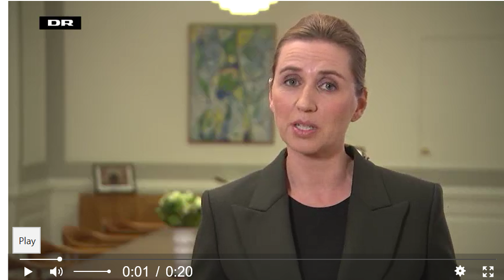Danes asked to “self-quarantine” for 14 days after travel in an area of special risk
A serious Danish Prime Minister talked to the Danes last night informing them of the new precautionary measures taken by the Danish health authorities to curb the spread of coronavirus.
The article continues below.
By Bente D. Knudsen
Only two days after the first press meeting concerning the status of coronavirus in Denmark, the health authorities took everyone by surprise when they announced the new reinforced measure:
If you have travelled to an area of special risk at present; China, Iran, South Korea and selected regions in northern Italy, upon return to Denmark, even if you have no symptoms, you are advised to stay at home for 14 days. For people employed within the Danish health sector or taking care of the elderly, it is mandatory to stay home for 14 days after travel to these above areas of special risk (in Danish the term used is særlige risikoområder).
Danish Prime Minister, Mette Frederiksen, was interviewed on both the DR and TV2 evening news, here she explained that there was mounting concern of spread from person to person in Denmark and therefore the containment strategy was expanded to include people, who do not show any symptoms, but who have travelled to the selected areas of special risk.
Public employees will receive their full pay and today the government is meeting with partners from the private sector to find out how employees in the private sector can be compensated for 14 days of home quarantine.
The article continues below.
The measure has been taken especially because of an increasing spread of coronavirus from northern Italy to Denmark. All of the Danish confirmed coronavirus cases can be traced back to the outbreak in Italy, and it is a popular destination for Danes, both for skiing but also for holidays in general.
The Danish Health Board, Sundhedsstyrelsen, is expecting that there will be more cases in Denmark in the coming weeks and that the risk of spread in general within the society is increasing.
Therefore, the medical sector and especially the Danish hospitals are working on establishing contingency plans to be able to hospitalise those in need.
Should a general epidemic bread out in Denmark, it is expected that 15 percent of those taken ill will need medical help and hospitalisation and five percent will need intensive care in hospitals.
The article continues below.
Information can be found on two sites:
Sundhedsstyrelsen at sst.dk here general information concerning the coronavirus and answers to questions can be found. There is a page in English as well.
The Danish Foreign Ministry has so called travel guides, rejsevejledninger, find the link here
Only in Danish though, information about selected countries can be found.
For instance, if you seek under Italy, information advising not to travel to four selected regions in northern Italy can be found;
Vi fraråder alle ikke-nødvendige rejser til: Regionerne Emilia-Romagna, Lombardiet, Piemonte og Veneto
The best advice from health experts world wide to avoid risk is still to step up on hygiene measures, wash your hands often, always when you have touched a surface such as a doorknob or other items in a public space, if you cannot wash your hands, use a disinfectant.
Wash your hand before eating or use a disinfectant.
Do not touch your mouth, nose or eyes if you were not able to wash or disinfect your hands.
Avoid close contact with people who cough or sneeze, or show other flu like symptoms.
If you have to sneeze or cough, do so in your armpit, do not sneeze/cough on surfaces, on other people, or into your hands.
You can find more information in our articles about the coronavirus in Denmark here


